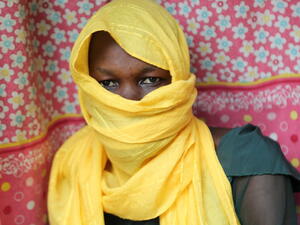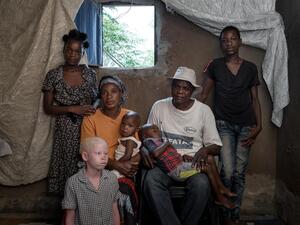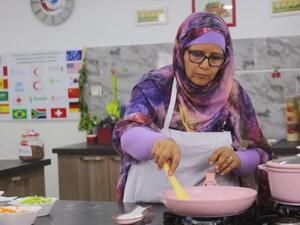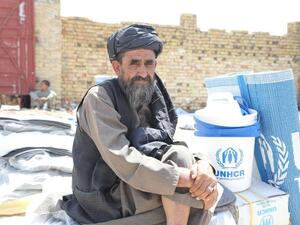UNHCR lays on free meals for Iraqi refugees during Ramadan
UNHCR lays on free meals for Iraqi refugees during Ramadan
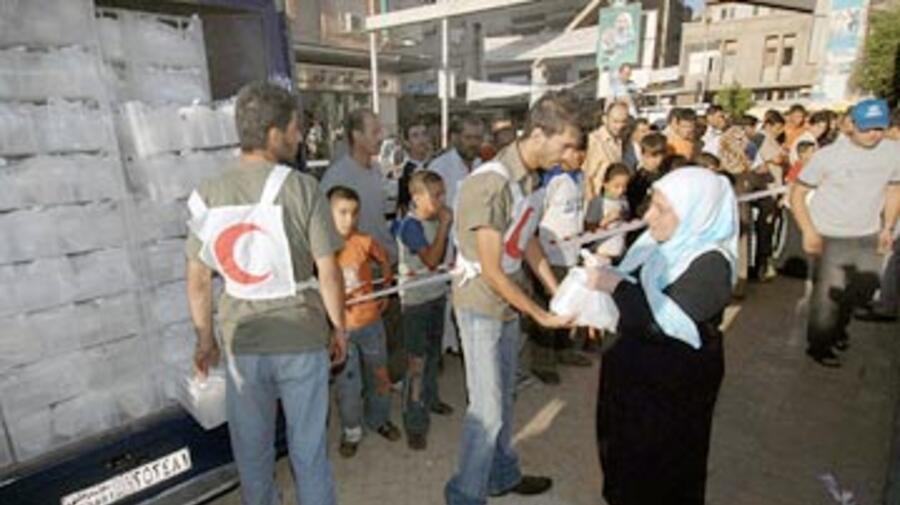
Syrian Arab Red Crescent volunteers hand out food on the first day of Ramadan.
DAMASCUS, Syria, September 14 (UNHCR) - At mosques across Damascus, imams used the call to prayer at the beginning of Ramadan to invite Iraqi refugees to share the first meal of the day with their Syrian hosts.
Many of the hundreds of thousands of Iraqi refugees in the city took up the offer and turned up at various venues around the city after sunset on Thursday for iftar, the first meal of the day during the Islamic month of fasting, prayer and repentance. The UN refugee agency is playing its part by providing some 270,000 meals for about 9,000 refugees over the next month.
The programme kicked off on Thursday evening when some of the neediest Iraqis turned up at mosques, restaurants and hotels for meals prepared by UNHCR's implementing partner, the Syrian Arab Red Crescent. Many went for the takeaway option and carried their meals back home in plastic bags.
"We know that the hardship faced by refugees is particularly acute during Ramadan. Many are running out of savings, and putting food on the table every day is a challenge that they never would have imagined they would have to face," said UNHCR Representative in Syria Laurens Jolles, explaining why the agency had launched the initiative.
At Yurmuck, a housing estate that is home to tens of thousands of Iraqi refugees, Red Crescent volunteers and members of the local mosque, including the imam, filled boxes of food for more than 1,200 refugee families.
For Haydat, the food was a welcome relief from the daily stress of providing food for his family. His shop in Baghdad was attacked late last year, and he and his family fled Iraq having lost virtually everything.
"It was a nice surprise to get this meal for my family; I heard about it when I came to pray yesterday. I am so grateful. I have fifteen people living in my small home, and today and for the rest of Ramadan we will eat well," he said after picking up food at the mosque serving Yarmuck, which also houses Palestinian refugees.
"It is so good to see this large number of people gathered to share food. We are all brothers - Palestinian, Syrian and Iraqi, and we all help each other. Solidarity is our strength, our tradition. When Iraqis eat this meal at home, it is with a message that we welcome and support them," said Abdullah Ahmed Abu Bakir, the imam, or leader, of the mosque.
Many Iraqi refugees were also enjoying the first meal of Ramadan on Thursday as guests of Syrian families. "Once again Syrian communities are showing their solidarity with Iraqi refugees through sharing the iftar meal at sunset with Iraqi refugees," noted Jolles.
"For every refugee that UNHCR is supporting with food during Ramadan, we know that there are countless others that ordinary Syrian families have helped during the past year. We are committed to helping Syria and its people to sustain this incredible hospitality," he added.
Meanwhile, 389 Palestinian refugees stranded at a camp in the no-mans land between Syria and Iraq also sat down to a meal on Thursday night served by Red Crescent volunteers. The fresh fruit and vegetables were particularly welcome to the refugees, who have limited access to fresh produce in their harsh environment at Al Tanf.
UNHCR started general food distribution to more than 33,000 Iraqi refugees two weeks ago, with a two-month food ration designed to meet the needs of families throughout Ramadan. The contents of the food package were chosen with the participation of refugees. It includes dates, cracked wheat, rice, lentils, jam and tinned foods.
By Sybella Wilkes and Hussam Mukhtar in Damascus, Syria

